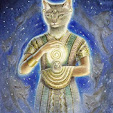Edinburgh International Festival 2010
Usher Hall, Sunday 22 August
Joyce DiDonato, mezzo-soprano
David Zobel, piano
Three Centuries of 'Amore'
A very interesting and unusual programme - this is what I love about Edinburgh, the chance to hear music one might not otherwise have come across. As the title implies, all the songs are about love in all its manifestation - and they are not all about unhappy or unrequited love!
The first set of songs date mainly from the 18th century, although there is one by Caccini (Amarilla mia bella) and one by Luigi Rossi (1597-1653), Se tu m'ami is attributed to Pergolesi, but the attribution is uncertain.
The first song in the first group was Danza, danza, fanciulla gentile, by Franceso Durante (1684-1755). It's a light-hearted exhortation to a girl to dance - the lovely rippling piano accompaniment, brilliantly executed by David Zobel, indeed exemplifies the spirit of the dance. The second song was an equally light-hearted song in which a girl tells her lover that she's sorry if he's suffering for love, but she's not obliged to love him alone. DiDonato presented these in a graceful, charming way, appropriate to the subject, but she was equally at home in the more serious songs which followed - the repetition of the name Amarilli in Amarilla mia bella sounded especially heartfelt.
The final piece before the interval was the Willow Song from Rossini's Otello. The introduction, originally for the harp, translates well to the piano, especially under the expert hands of David Zobel, and DiDonato really got to the heart of Desdemona's grief and forebodings of death....heartbreaking!
After the interval, the programme continued with songs by 20th century composers, many of whom are hardly remembered today - such as Francesco Santoliquido (1883-1971) (yes, that was his name; DiDonato made a plea from the stage not to succumb to the temptation to call him "Frankie Holywater"!!) She sang four songs by this composer, all poems he had written himself. I especially liked the first songs, L'assiolo canta (The horned owl sings), which is a song a lover sings on a serene summer's evening...it's a perfect blend of words and music. The longest song, L'incontro (the meeting) about two lovers who meet again after a long time apart, had perhaps less individual character than the previous songs, sounding rather like a blend of Puccini and Richard Strauss - none the worse for that, of course! - giving the singer a chance to shine in soaring cadences.
This was followed by a setting of Leopardi's Oscuro e il ciel by Ildebrando Pizzetti, which is a sublime blending of words and music, expressing passion and yearning as much with the piano as with the voice.
The final group consisted of songs by Italian composers about foreign, 'exotic' climes, such as Leoncavallo's Serenata francese.
After the recital proper, when Joyce DiDonato returned for her encore, she spoke in tribute to the late Sir Charles Mackerras. She had originally come to Edinburgh to sing the role of Idamante in Idomeneo under him (in the event, Sir Roger Norrington conducted). She then sang 'Voi che sapete' as a sort of farewell to Sir Charles, and concluded the evening with an extract from La Donna del Lago.










No comments:
Post a Comment